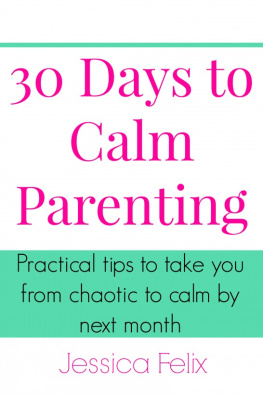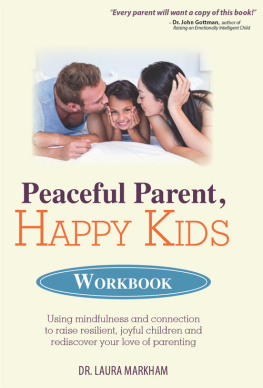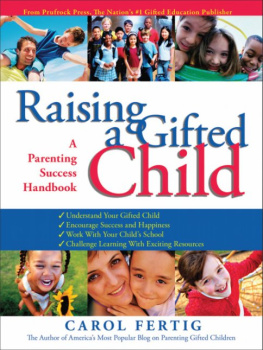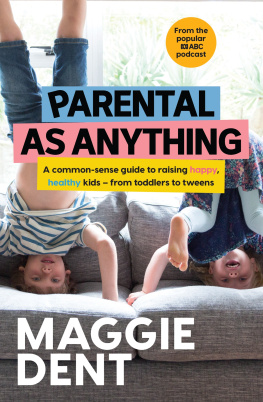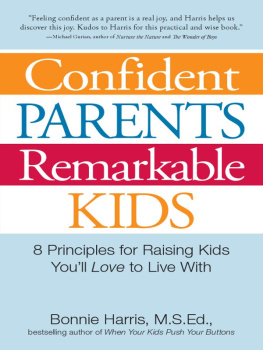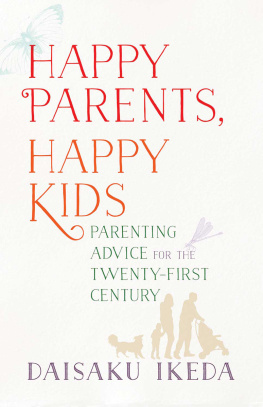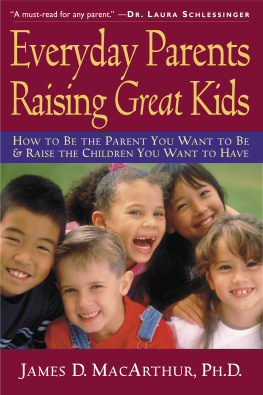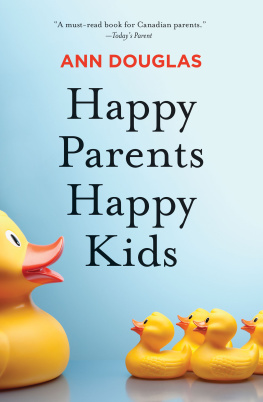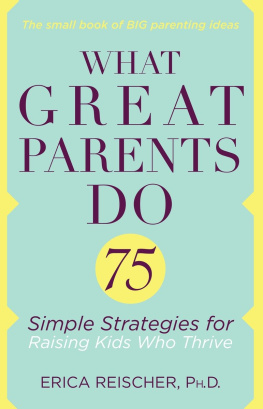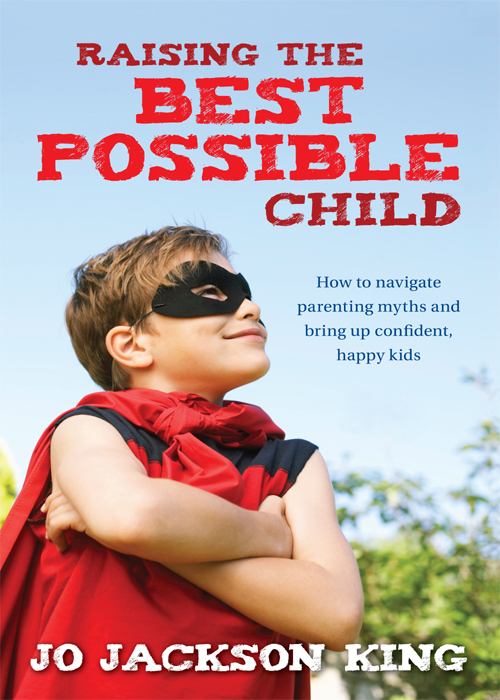With grateful thanks to my three sons:
Tim, who found references for me and dedicatedly read each draft through for errors of meaning at which he then laughed immoderately;
Sam, who generously let me write about him and also kept up a supply of comic relief for his serious mother;
and Rafael, who arrived just as I was embarking on the bulk of the research for this book and who happily snuggled and breastfed while I read and wrote in the very early hours of the morning.
Contents
Ive always been a great reader of parenting books.
I remember reading one book that argued forcefully for positive parenting. The central message was this: If you only pay attention to positive behaviours in your children, they alone will be reinforced, and the behaviours you dont like will steadily disappear.
At the time I was in my early thirties with two little boys. I retold the message to my husband Martin and my mother how exciting it would be to be able to drop the discipline and just focus on the good things!
In my experience, if you ignore children who are behaving badly they will scale up their behaviour until you do notice, advised my mother.
But I ignored her. Perhaps I had already internalised the message that I should only pay attention to what I wanted to see and hear?
We started our new parenting approach at breakfast the following day. Tim (four and a half years old) did not like to sit at the table to eat. In fact, he did not even really like to eat. He appeared at the doorway and slowly approached the breakfast table. Martin and I beamed at him approvingly. Tim reached the table only to promptly duck under it and drop to the floor beneath.
Instead of asking him to sit and eat, we steadfastly ignored him and talked of other things. One little hand shot up to the edge of the table, and then another. I thought for a moment that he had capitulated and was going to swing himself out and eat with us. But then the hands began a dialogue, with the right having a deep growly voice and the left squeaking plaintively. It was quite clearly the story of Dad telling Tim to eat, and Tim resisting.
I could see Martin was going to say something about this and so I reminded him in a whisper of the new rule. We only notice good behaviour. He did not look particularly happy about it but he nodded his agreement.
The dialogue presently stopped and I could hear scuffling sounds under the table. Luckily I am constructed so that I can talk ceaselessly and I was able to give an excellent impression of ignoring these intriguing noises. However Martin was not performing well in the supporting role, and my attention was eventually caught by the expression on his face. He is hard to read at the best of times, but at that precise moment his expression was so utterly impassive so wooden that he would not have been out of place in a shop window display.
I was to find out later that Tim had been biting his leg at the time.
But we finished our breakfast with me still in ignorance of this. Martin went to work and I continued on with my new parenting method.
One of the boys habits I particularly disliked was play-wrestling. Someone was always hurt. Later we instituted a rule that they could only wrestle with their father which has stood the test of time but on this particular day I adhered firmly to the rule of ignoring what I didnt want to see.
While I hung out washing I could hear the stealthy sounds of Tim and Sam beginning to wrestle. About here is where I would normally have broken it up. Roll, roll, and thump of them together on the floor. And then, over in the other direction roll, roll, thump. And then a howl.
I picked up my basket and walked swiftly past the combatants, now well separated and attempting to hide tears.
They did not wrestle again.
I seized upon this first bit of evidence that my new parenting approach was working with a delightful feeling of inner certainty. This was the way forward! But shortly after I could hear the steady sound of objects being thrown. Out on the veranda my sons were throwing Lego pieces at each other. I feverishly raced back to consult the book. This, it said, was normal. Wait them out. And, soothed by the writers utter certainty, I sat with a cup of tea and kept to my chair as each son simultaneously began crying. Right now, I told myself, they were learning that the consequence of throwing things is that someone gets hurt. I was forgetting that this had been experienced before and was showing no sign of leading to a change in behaviour.
It was time for morning tea which we shared in perfect amity. There was no mention of the throwing by them and no mention of the toys everywhere by me. I ignored the widely spread Lego; as evidence of negative behaviour it was beneath my notice.
Later that day the boys were left to play together again on the veranda. And this time they played in contented silence. There was no play wrestling, no throwing. They were utterly engaged in whatever it was they were doing. I gratefully read some more of my parenting book. I marvelled that the author a young male postgraduate student without children had such a grasp on what worked with children and how extraordinarily easy his system was! Why was it not commonly used?
And with that thought I began to wonder just what it was that my children were doing on the veranda, so I decided to investigate.
They had taken four large bottles of poster paint and squeezed each out onto the vinyl floor. The colourful mass was then diluted with water and distributed widely. They had then invented a game of flicking. You dipped your paintbrush into the paint and water and then flick: you saw just how much red, purple, blue and green paint you could throw up onto the white walls and ceiling.
When your mother leaves you to play for more than an hour, that is a great deal of paint.
It is very odd, some seven years later, to be the one who is writing a book on parenting. In my defence, it was not my idea to write this book.
I became friends with the editor on my first book and, being the mother of two young children, she quickly got into the way of picking my brain about child development. Not only am I an occupational therapist, but my mother is also, which between us gives me some 50 plus years of clinical experience to ratchet through, looking for answers.
To add to this, I am, tragically, more than a little like a hound. If I am asked a question I take the scent and am off on the hunt straightaway.
I remember not having an answer for my sister-in-law Minnies question about one of her children who was briefly ill.
We have Health Direct in WA, Minnie. You just call 1800 I said, giving her the number in full twice, and rather hopefully.
Oh, I have that too. I just call and she rattled off a string of numbers.
I wonder why it is different to the one we call? I said.
Let me just repeat that for you, she said.
The number sounded somewhat familiar.
Its yours, she said eventually, as it was evident I wasnt going to make the connection.
And, sure enough, having spoken and read and nutted out the illness I was back to her in short order with a few ideas to deal with it. Once a question has been asked Im programmed to return with a range of answers. Even, my husband Martin has just added, when a person doesnt actually ask you to do it.
But my editor Jo Mackay did actually ask me. First of all she asked if there was a book with all the occupational therapy knowledge in for parents, and when I said, no, there wasnt, as Mum and I had often looked for such a book, she asked if I could write one. And then she came up with the name the one on the cover. I pointed out to her that her original concept had not come close to the scope of this one. This book goes a long way beyond occupational therapy. This would need to draw from a much wider pool of knowledge. But she was not to be roped into a discussion of how difficult the project would be. She changed the subject and said how she had been longing for a book that was not about turning your child into Einstein or getting them to read at two or having them sleep through the night at three minutes old


